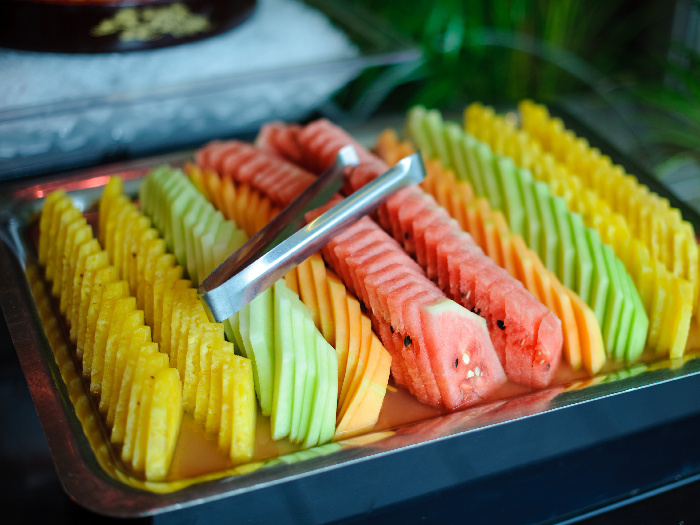You may have seen fresh cubed melons in the supermarket aisle and wondered about the difference between the salmon-orange and the green melons. Both are delicious and sweet and are in fact, two different melons – honeydew melon and cantaloupe. So, let’s find out who’s the winner in the battle of honeydew vs cantaloupe.
Honeydew Vs Cantaloupe
To begin with, honeydew and cantaloupe are melons which belong to the gourd family (Cucurbitaceae). But there are a few differences. Honeydew melon is the pastel green-colored melon, with a sweet, juicy taste whereas cantaloupe is salmon-orange and is slightly less sweet. [1]
Originating from West Africa, honeydew melon has a smooth rind. Cantaloupes have rough-netted skin. Both melons are available worldwide and are popular especially during the summer season. The melons can be used as a quick smoothie or a cool DIY drink for the summers. They can also be used in salads, snacks, or eaten by themselves. Honeydew melon is used in desserts and to make soups. Usually, cantaloupe is paired with Parma ham or prosciutto as a summer classic in Italy.

Melons are dense in antioxidants, vitamins, and nutrients. Photo Credit: Shutterstock
Calories
Honeydew and cantaloupe have comparable nutrient profiles. So which one you choose naturally depends on your preference. Cantaloupe and honeydew provide free-radical scavenging antioxidants and several health-promoting vitamins that aid in fighting diseases.
Honeydew
According to the United States Department of Agriculture and National Nutrient Database, 1 cup (170g) of diced honeydew melon provides: [2]
• Energy: 61 calories
• Proteins: 0.92g
• Carbohydrates: 15.45g
• Sugar, total: 13.80g
Good: It is a good source of vitamin B6, folate, potassium, and also an excellent source of vitamin C. This fruit is low in sodium and very low in saturated fat and cholesterol.
Bad: A large portion of the calories come from sugars.
Cantaloupe
Let’s have a look at how cantaloupe fares at the calorie intake. 1 cup (156g) of diced cantaloupe provides: [3]
• Energy: 53 calories
• Proteins: 1.3g
• Carbohydrates: 13g
• Sugar, total: 12g
Good: Cantaloupe is abundant with antioxidants that include chlorine, zeaxanthin, and beta-carotene, all of which protect against a range of diseases.
Bad: In the battle of honeydew vs cantaloupe, cantaloupe carries a higher risk of being tainted with harmful bacteria. According to a report published in the Epidemiology and Infection journal, cantaloupe can be easily infected with Salmonella and E. coli bacteria. So you would want to avoid this melon if your immune system is weak or you are pregnant. [4]
Who’s The Winner?
In the melon war, on the nutrient front, the cantaloupe is the clear winner! A one-cup serving of cantaloupe contains fewer calories (54 in cantaloupe and 64 in honeydew), more of the vitamins A, B, and C, more potassium, and more magnesium.
But we would say either melon is a wonderful choice as both are low in calories and are power-packed with vitamins, minerals, and antioxidants. Irrespective of choosing honeydew or cantaloupe, including a plethora of fruits (also melon) in your diet is a fabulous way to promote overall wellness, increase antioxidant bustle, and decrease infection in your body.
